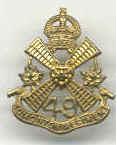GloriousRuse
Posts: 906
Joined: 10/26/2013
Status: offline

|
A few big picture lessons. Hopefully not too much "buy low, sell high", but a certain amount of that is in there:
It’s All About the Force Ratios.
In both games played, despite our focus on operational and tactical level decisions in the moment, the outcomes in a theater stemmed from the strategic level – which meant force ratios here. Not to re-hash Boyd et al, but higher levels of war trumped lower ones.
Basically, in whatever sub-theater the allies have enough forces for overmatch, they will win. Either through blunt force or by moving into space and just going places no moderate amount of force would consider, or can cover. Once they start winning big enough, they start killing units and not just men. Once units start dying, the ratios get more lopsided, and more and more holes open in a cascading failure. The only re-dress the Germans have if this starts is abandoning terrain -locally, operationally, or even strategically - and hoping to patch together a line somewhere where the allies can’t just overwhelm them with power and mobility. In contrast, where the Germans can keep the ratios only marginally disadvantageous, they can bleed the allied VP score pretty badly.
Bluntly, Loki is a superior mechanical/tactical player than me. His experience, his talent for assembling powerful custom formations, his eye for detail – all things I can’t match without sitting down and pouring a lot of thought into it, whereas he does naturally.
I didn’t get through the mountains of N. Italy faster than Loki because I was better, or because my narrow thrust operations were all that more clever than his shifting broad front. I got through because I had another army’s worth of divisions and thousands of aircraft down there.
As an earlier example, I was barely able to contain Loki’s Rome landings with tattered regiments, whereas he handily destroyed multiple US divisions. In part due to his superior tactical skill and my choice of landing sites, but also because he had several powerful panzer formations in theater whereas I had pissed away some of mine in the south and had not been able to get many more into Italy.
In the Rhone, I didn’t win through being any better at the game. Far from it. I won because I could throw two full armies against a couple reinforced corps.
And so on. Assuming two players within a reasonable range of mechanical capability, the guy who brings a disproportionately large force (beyond the basic “allies have more stuff”) to the party wins.
For the allies, this is mostly a matter of math with some redeployment scheduling (Med to England – 7 week planning factor after accounting for refit, England to Med is 5 because you’re bringing fresh troops who don’t need to march before getting on boats and rails.)
For the Germans, there is the added complication that merely employing your best units – where you really make up your ratios - runs both them and the supporting national stockpiles down. I’m now thinking of the game for the Germans as 5 boxes – S. Italy, N. Italy, S. France, N. France, Low Countries – where you have to get the right units to the right box, knowing that while you might be able to use them later, once used they’ll be much reduced in value.
So…if that’s true…
Then the two most important decision cycles in the game are early ’43 and early ’44. Not because of how you decide to invade/defend Italy or France, but because those are the periods you really decide what is going where, and when/where you’ll be strong. For the Germans in particular, what you send down to Italy in those first few desperate turns has a massive impact on the rest of the game.
For the WA Jan-April ’44 period essentially locks in your force ratios and determines how easy or hard each sub theater is going to be. By extension, it determines the tempo and opportunities in each theater as well. Basically, you’re each making calls on a mix between what you want to achieve/deny for the next 30-40 turns, and balancing that with where you actually think you can create the sort of force mismatch that will allow you to do that. Kind of chicken-egg, though I’m leaning towards the idea that if the allies can create a big win anywhere, it unhinges the Germans everywhere.
I would be interested to hear people's means and methods for handling this decision, given it appears to be so utterly vital.
The Allied Secret Weapon is Mobility
So – I got the first hints of this in an embarrassing turn set last game where Loki tore me apart near Paris. He was merciful. Yes, the WA have scads of airpower. And sea power. And firepower. And stuff. But everyone knows that.
What is overlooked is just how good the WA are at mobile operations.
1. They have plenty of good cavalry. Both in terms of the actual cav groups, and separate regiments and brigades. The Germans have a handful of motorized brigades and press-ganged security regiments. They can’t afford to spend their panzers as cav. Meanwhile the allies can freely recon virtually any apparent opening – by July of my run as the WA, I was literally preceding every major move by sending a cav group to poke around and see what was out there, and if the lines were in contact, by seeing if I could float around the flank or at least see if there was nasty surprise being held in reserve. Between this and air recon, where information is scarce the WA are much more capable of developing the situation. And if a ground recon element gets knocked back…well, 1,000 troops sounds like a lot, but is nothing at all compared to a full multi-week assault.
2. Any allied unit can be a mobile unit. Another Loki trick - temporary motorization means that for little more than a week’s AP, an entire corps can be attacking a weak point, surrounding a unit, going through a gap or holding open a breakthrough. You can use this as a hammer by shifting power to a weak spot, but I found its greatest value came in meaning the WA really have a reserve anywhere. If you hold off on moving a handful of infantry divisions until you’ve seen what some recon and initial attacks bear out, all of a sudden you can have the forces you want where you want them – in essence, you can almost always support a breakthrough, finish a pocket, or go to an open flank. It costs someone else in trucks and supplies, but chances are that’s a lot less relevant than wherever you just committed. Or you can save up and motorize an entire army to go where no German player could reasonably predict it should be. And you won’t have Monty crumping about it either…
3. More prosaically, they just have more mobile formations that move faster (not technically any different in max speed, but by the time you’re out of Italy, the German truck pools and tracks are losing some steam) and can move longer than the Germans (better logistics until you get to the Rhine, by which time the Germans are out of everything).
< Message edited by GloriousRuse -- 5/25/2020 8:14:04 PM >
|
 Printable Version
Printable Version

































 New Messages
New Messages No New Messages
No New Messages Hot Topic w/ New Messages
Hot Topic w/ New Messages Hot Topic w/o New Messages
Hot Topic w/o New Messages Locked w/ New Messages
Locked w/ New Messages Locked w/o New Messages
Locked w/o New Messages Post New Thread
Post New Thread